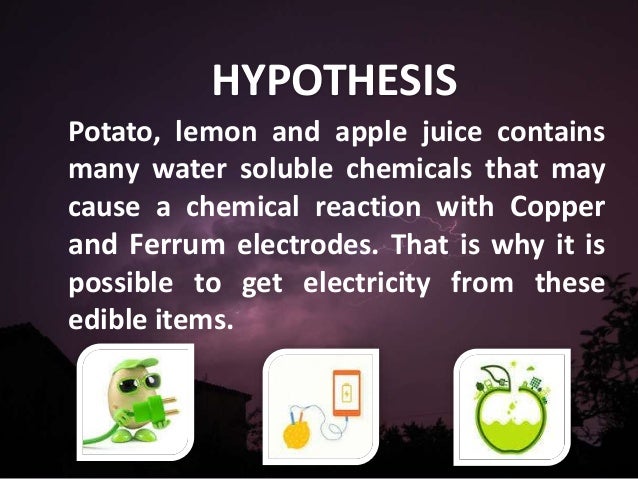45 lemon vs potato battery
Lemon vs. Potato Battery Science Fair Project - YouTube Finn Aloysius demonstrates his two batteries in his science fair project. How to Create a Potato Battery: 13 Steps (with Pictures) - wikiHow 5. Attach one clip lead to the copper coin and the other clip to the positive side of the battery box. Look at the battery box and identify the (+) sign on one of the sides. Clip one end of the wire to this positive side. Take the other end and clip it to the copper coin in the first potato.
Ask an Expert: Lemon and potato batteries - Science Buddies Potatoes and lemons contain electrolytes that transport ions in the battery. The battery also needs electrodes, usually zinc and copper. Potato and lemon batteries will last as long as the electrolytes are present and the electrodes are intact. The battery won't work if the potato or lemon dries out or if an electrode dissolves.
Lemon vs potato battery
How to Create a Battery from a Lemon: 14 Steps (with Pictures) - wikiHow To make a multi-cell lemon battery you will need four copper pennies, four galvanized nails, four lemons, a knife, 15 inches of copper wire, wire cutters, a ruler, and a voltmeter. Any lemon will do, but a lemon with a thinner rind will make a better battery. Adult supervision is strongly recommended, particularly when using the knife. hypothesis - Potato VS. Lemon power energy Lemon power energy Hypothesis Our Hypothesis We predict the lemons will produce more voltage then potatoes. This is because I think the amount of liquid and acid affects the amount of electricity conducted and lemons have more acid and liquid then potatoes. Make a Potato Battery to Power an LED Clock - ThoughtCo A potato battery is a type of electrochemical cell.An electrochemical cell converts chemical energy into electrical energy. In the potato battery, there is a transfer of electrons between the zinc coating the galvanized nail that will be inserted into the potato and the copper wire that will be inserted another part of the potato. The potato conducts electricity, yet keeps the zinc ions and ...
Lemon vs potato battery. Ask an Expert: Potato vs. Lemon Battery - Science Buddies Oct 28, 2007 · A battery cell made with a potato might provide a different amount of current than a battery cell made with a lemon or an onion. Battery cells made with different electrode materials, like copper, nickel, or zinc might produce different voltages. Batteries with different electrode shapes or surface areas might have different internal resistances. Why Do Some Fruits and Vegetables Conduct Electricity? A potato battery can produce only about 1.2 volts of energy. Takhistov said you would need to link many potato batteries in parallel to create enough of a current to charge a device like a phone ... A Potato Battery Can Light Up a Room For Over a Month A couple years ago, researchers at the Hebrew University of Jerusalem released their finding that a potato boiled for eight minutes can make for a battery that produces ten times the power of a raw... PDF Lesson Plan on Fruit and Potato Battery: How to Utilize the Chemical ... The two metal components are called electrodes, they are the parts of a battery through which electrical current enters and leaves the battery. With a zinc and copper setup, the electron flow is out of the copper nail (a penny could also be used) and into the zinc nail through the acidic juice inside the lemon or the potato.
Re: WHY DO POTATOES CONDUCT MORE ELECTRICITY THAN LEMONS? That USDA data suggest potato would have the higher electrical conductivity because of its much higher potassium content. However, the USDA site does not include citric acid content and lemons contain from about 3.7 to 8.4 grams of citric acid per 100 grams. Based on these numbers, I would guess that lemon juice would have a higher EC than ... Science Experiments Using a Potato as a Battery First, begin by cutting a potato in half horizontally, and place the halves flat-side down on a plate. Then, attach one end of a wire to a nail and one end of a separate wire to a penny. Stick the nail and penny into the same half of a potato. Wrap the third wire around the other penny and stick that penny into the second half. How to Make a Lemon Battery | Science project | Education.com Stick the paperclip, zinc covered nail or zinc strip into a spot in the lemon about 1/4 inch away from the copper wire. Make sure the wires don't touch. The wires need to be close to each other because they will be swapping matter in the chemical reaction. If they are too far apart, the matter might lose their way. Potato Battery Experiment - Explanation, Step by Step ... - VEDANTU While the world is facing an energy resources crisis and we need better ways to lead a sustainable life, a potato battery is a useful way out. A potato battery can cost up to 50 times cheaper than an AA battery. A potato battery can cost up to 9 dollars whereas a normal 1.5-volt alkaline battery costs around 50- 84 dollars.
Comparing Apples, Oranges, and Batteries - Instructables I think it's important to understand and conceptualize by doing - unfortunately, most off the shelf batteries are not friendly or safe to being taken apart and experimented with. Likely, you've heard of lemon batteries, potato batteries, and any number of variations - so let me bring you one more. The apple battery. Re: why would a potato battery run longer than a lemon battery A lemon, where the electrolyte has a lot of acid, is much more corrosive than a potato, which has more neutral pH. Your anode, which is made of a reactive metal, will corrode in either the potato or the lemon, whether or not you are drawing power from it -- but it will corrode much faster in the lemon. Lemon Battery Science Experiment - Building Circuits Fruit Battery However, the potato battery was definitely a lot more work. So if you are looking for a quicker experiment, the lemon battery is faster and easier. However, both have significant opportunities for learning and would make great science fair projects. Why not do both yourself and see what you think? Potato Battery | DC Circuits | Electronics Textbook One lemon (optional) Strip of zinc, or galvanized metal Piece of thick copper wire The basic experiment is based on the use of a potato, but many fruits and vegetables work as potential batteries! For the zinc electrode, a large galvanized nail works well. Nails with a thick, rough zinc texture are preferable to galvanized nails that are smooth.
Lemon/Potato Battery Lab - Amelia Parry's Science Website Conclusion: research and explain how lemons and potatoes convert chemical to electrical energy The lemon/potato battery produces electricity by converting chemical energy to electrical energy. The lemon juice is acidic and works as a electrolyte. The lemon itself composes the transfer of electrons to and from the electrolyte.
Why Does A Potato Battery Work Better Than A Lemon Battery? You can figure out the dissociation factor, αα, from the dissociation constant: where CH3ACH3A is the formal concentration of the acid. 2) If you have more species in solution, it will depend on the pH of the solution. In general, you’ll have this expression: and it changes logarithmically in between.
Abstract - Potato VS. Lemon power energy In this project we wondered which food product (potatoes or lemons) would produce the most voltage. We ask this question because we wanted to learn if potatoes and lemons would produce enough current to power a motor which would power our solar system. We thought lemons would produce more voltage than potatoes because lemons have more acid.
Q & A: Fruit Batteries - University of Illinois Urbana-Champaign A potato delivers a higher power (more Watts) than a lemon in both parallel and series circuits. I just did an in depth project in my Biological Engineering class at the University of Arkansas on biological batteries and I tested both lemons and potatoes. The potato always produced more power than the lemon.
Lemon battery - Wikipedia A lemon battery is a simple battery often made for the purpose of education. Typically, a piece of zinc metal (such as a galvanized nail) and a piece of copper (such as a penny) are inserted into a lemon and connected by wires. Power generated by reaction of the metals is used to power a small device such as a light-emitting diode (LED).. The lemon battery is similar to the first electrical ...
How To Make A Lemon Battery? - Lemon Battery Experiment - BYJUS Strip around two and a half inches of plastic off the wire and cut that section away from the roll of copper wire you have. Take the paper clip and straighten it out. Using the clippers cut it to the same length as the wire of copper. Rub off any of the rough spots that are on your conductors.
Lemon Battery - Panasonic 1 x zinc plate per battery 1 x big lemon (or two small lemons) 3 x alligator-clip wires 1 x 5 mm LED (2.2 V) ・Kitchen knife ・Cutting board ・Tin snips If you can't get metal plates, don't panic! Use large galvanized nails (they must be galvanized) or paperclips instead. Both are coated in zinc. Copper coins or speaker wire will also work.
Lemon Batteries and Potato Power | HowStuffWorks The solution is typically an acid. Car batteries use sulfuric acid, but potatoes contain phosphoric acid, which also works. The acid steadily eats away at the zinc, a chemical reaction that releases spare zinc electrons. These electrons then join with spare hydrogen ions in the acid to create hydrogen gas.
Why Does A Potato Battery Work Better Than A Lemon Battery? Back in 1st Grade I made a potato battery as a school project. I didn't really give it much thought then, but now revisiting it, I realized how complex and a...
Make a Potato Battery to Power an LED Clock - ThoughtCo A potato battery is a type of electrochemical cell.An electrochemical cell converts chemical energy into electrical energy. In the potato battery, there is a transfer of electrons between the zinc coating the galvanized nail that will be inserted into the potato and the copper wire that will be inserted another part of the potato. The potato conducts electricity, yet keeps the zinc ions and ...
hypothesis - Potato VS. Lemon power energy Lemon power energy Hypothesis Our Hypothesis We predict the lemons will produce more voltage then potatoes. This is because I think the amount of liquid and acid affects the amount of electricity conducted and lemons have more acid and liquid then potatoes.
How to Create a Battery from a Lemon: 14 Steps (with Pictures) - wikiHow To make a multi-cell lemon battery you will need four copper pennies, four galvanized nails, four lemons, a knife, 15 inches of copper wire, wire cutters, a ruler, and a voltmeter. Any lemon will do, but a lemon with a thinner rind will make a better battery. Adult supervision is strongly recommended, particularly when using the knife.












0 Response to "45 lemon vs potato battery"
Post a Comment